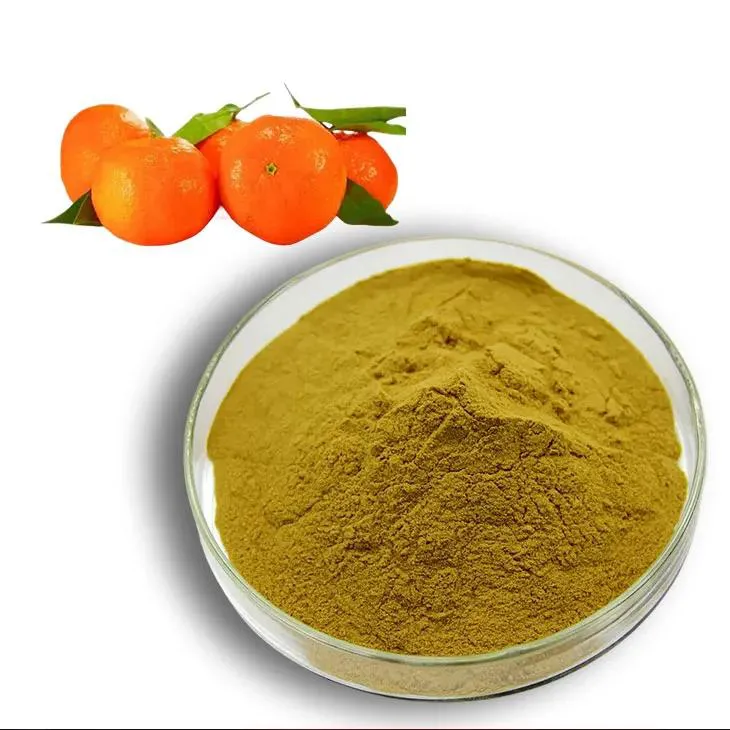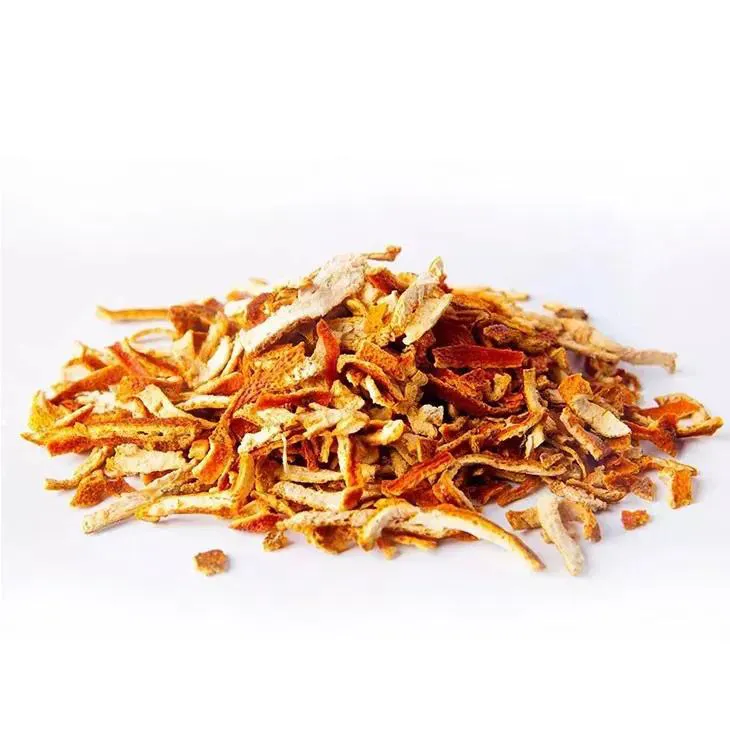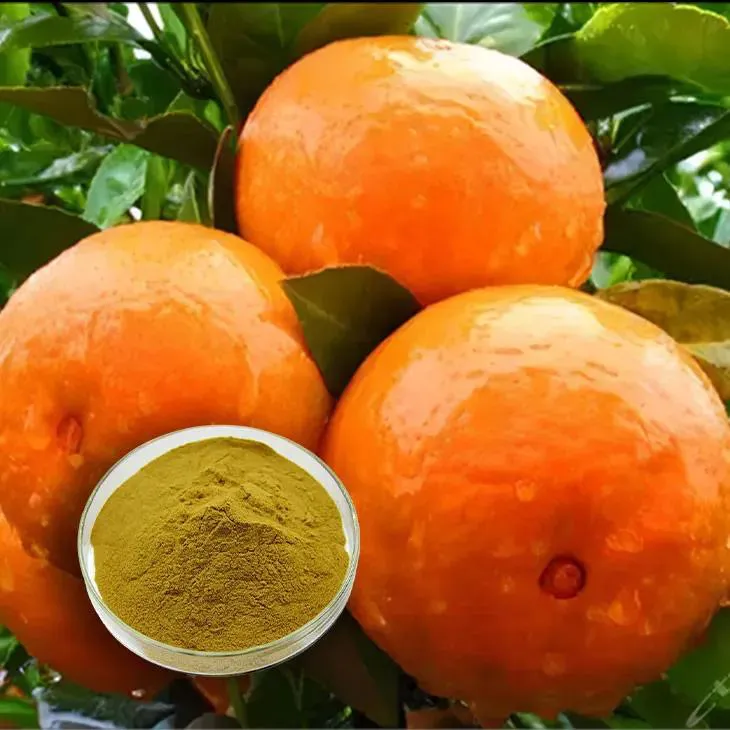- 0086-571-85302990
- sales@greenskybio.com
Best Citrus Bioflavonoids: A Guide to Choosing the Best Citrus Bioflavonoids
2024-11-12

Introduction
Citrus bioflavonoids have been gaining increasing attention in the fields of health and nutrition. These natural compounds, found abundantly in citrus fruits, offer a plethora of potential health benefits. However, with a wide variety of citrus bioflavonoids available, choosing the best one can be a complex task. This comprehensive guide aims to demystify the world of citrus bioflavonoids, enabling you to make an informed choice based on your health needs and goals.

What are Citrus Bioflavonoids?
Citrus bioflavonoids are a group of plant - based compounds that are responsible for the color, taste, and aroma of citrus fruits. They are polyphenolic substances that play important roles in the plant's defense mechanisms against environmental stressors. In the human body, they exhibit various biological activities, such as antioxidant, anti - inflammatory, and anti - microbial properties.
There are several types of citrus bioflavonoids, each with its own unique chemical structure and properties. The two main classes are flavanones and flavones, which are further divided into sub - types.

Flavanones
Hesperidin
Hesperidin is one of the most well - known flavanones in citrus fruits. It is predominantly found in oranges and lemons. Hesperidin has been studied extensively for its potential health benefits.
- It has strong antioxidant properties, which help in neutralizing free radicals in the body. Free radicals are unstable molecules that can cause oxidative stress and damage to cells, leading to various diseases such as cancer, heart disease, and neurodegenerative disorders.
- Hesperidin also has anti - inflammatory effects. Inflammation is a natural response of the body to injury or infection, but chronic inflammation can be harmful. By reducing inflammation, hesperidin may contribute to the prevention and treatment of inflammatory diseases such as arthritis.
- Studies have shown that hesperidin may improve blood vessel function. It can help in reducing blood pressure by relaxing the blood vessels, thereby reducing the risk of hypertension and related cardiovascular problems.
Naringenin
Naringenin is another important flavanone found in grapefruit. It shares some similarities with hesperidin in terms of its health - promoting properties.
- As an antioxidant, naringenin helps to protect cells from oxidative damage. It scavenges free radicals and may also enhance the activity of other antioxidant enzymes in the body.
- Naringenin has been shown to have anti - obesity effects. It may regulate lipid metabolism by reducing the absorption of dietary fats and increasing the breakdown of stored fats in the body. This makes it a potential candidate for weight management.
- It also exhibits anti - cancer properties. Although more research is needed, preliminary studies suggest that naringenin may inhibit the growth and spread of cancer cells, particularly in breast and prostate cancers.

Flavones
Diosmin
Diosmin is a flavone that is often used in combination with hesperidin in dietary supplements. It is mainly sourced from citrus fruits such as oranges and tangerines.
- Diosmin is known for its vascular protective effects. It can strengthen the walls of blood vessels, making them more resistant to damage. This is beneficial for preventing varicose veins, hemorrhoids, and other venous disorders.
- It has anti - inflammatory properties that can help in reducing swelling and pain. In particular, it has been shown to be effective in treating chronic venous insufficiency, a condition characterized by poor blood circulation in the legs.
- Like other citrus bioflavonoids, diosmin also has antioxidant activity, which contributes to overall health by protecting cells from oxidative stress.
Rutin
Rutin is a flavone that is widely distributed in citrus fruits as well as other plants. It has a long history of use in traditional medicine.
- Rutin is a powerful antioxidant. It can prevent the oxidation of low - density lipoprotein (LDL) cholesterol, which is a major risk factor for heart disease. By reducing LDL oxidation, rutin may help in maintaining a healthy cardiovascular system.
- It has anti - platelet aggregation properties. Platelets are cells in the blood that play a role in blood clotting. Excessive platelet aggregation can lead to the formation of blood clots, which can cause heart attacks and strokes. Rutin helps to prevent this by inhibiting platelet aggregation.
- Rutin may also have anti - allergic effects. It can modulate the immune response in allergic reactions, reducing symptoms such as itching, sneezing, and swelling.
Factors to Consider for Choosing the Best Citrus Bioflavonoids
Health Goals
If your main health concern is cardiovascular health, then bioflavonoids such as hesperidin, naringenin, and rutin may be good choices. Hesperidin can improve blood vessel function and reduce blood pressure, naringenin may help in lipid metabolism and prevent oxidative stress in the cardiovascular system, and rutin can prevent LDL cholesterol oxidation and inhibit platelet aggregation.
For those interested in anti - inflammatory benefits, hesperidin, diosmin, and other citrus bioflavonoids with anti - inflammatory properties can be considered. They can be useful in treating or preventing conditions such as arthritis, chronic venous insufficiency, and other inflammatory disorders.
If you are looking for antioxidant support, all of the citrus bioflavonoids mentioned above, including hesperidin, naringenin, diosmin, and rutin, are excellent sources of antioxidants. They can help in protecting cells from free radical damage and reducing the risk of various diseases associated with oxidative stress.
Source and Quality
When choosing citrus bioflavonoid supplements, it is important to consider the source. Look for products that are derived from high - quality citrus fruits. Organic sources are often preferred as they are less likely to be contaminated with pesticides and other harmful substances.
The manufacturing process also plays a role in the quality of the product. Ensure that the supplement is produced using good manufacturing practices (GMP). This helps to ensure that the product is pure, potent, and free from contaminants.
Bioavailability
Bioavailability refers to the proportion of a substance that is absorbed and available to have an active effect in the body. Different citrus bioflavonoids may have different levels of bioavailability.
Some forms of bioflavonoids may be more easily absorbed when combined with other substances. For example, hesperidin is often more bioavailable when combined with vitamin C. Therefore, when choosing a citrus bioflavonoid supplement, consider whether it contains other ingredients that can enhance its bioavailability.
Conclusion
Citrus bioflavonoids offer a wide range of potential health benefits, from antioxidant and anti - inflammatory effects to specific benefits for cardiovascular health and more. When choosing the best citrus bioflavonoids, it is important to consider your individual health goals, the source and quality of the product, and the bioavailability of the bioflavonoids. By taking these factors into account, you can make an informed decision and potentially reap the many rewards that citrus bioflavonoids have to offer.
FAQ:
What are citrus bioflavonoids?
Citrus bioflavonoids are a group of plant - derived compounds found in citrus fruits such as oranges, lemons, and grapefruits. They are polyphenolic substances that have antioxidant, anti - inflammatory, and other beneficial properties for human health.
What are the main types of citrus bioflavonoids?
The main types of citrus bioflavonoids include flavanones (such as hesperidin and naringenin), flavones (like luteolin), and flavonols. Each type has its own unique chemical structure and potential health effects.
How do citrus bioflavonoids promote health?
Citrus bioflavonoids promote health in several ways. Their antioxidant properties help to neutralize harmful free radicals in the body, reducing oxidative stress. They also have anti - inflammatory effects, which can be beneficial for conditions related to chronic inflammation. Additionally, some citrus bioflavonoids may support cardiovascular health, improve immune function, and have potential anti - cancer properties.
What factors should be considered when choosing the best citrus bioflavonoids?
When choosing the best citrus bioflavonoids, several factors should be considered. First, the purity and quality of the product are important. Look for products that are free from contaminants and have a high concentration of bioflavonoids. Second, consider the specific health benefits you are seeking. Different types of bioflavonoids may be more effective for certain conditions. Third, the source of the bioflavonoids should be reliable, such as from well - known and trusted manufacturers or from natural citrus sources. Also, consider any potential interactions with medications or other supplements you may be taking.
Can citrus bioflavonoids be obtained from diet alone?
Yes, citrus bioflavonoids can be obtained from diet alone. Eating a variety of citrus fruits, as well as consuming citrus - based products like juices (in moderation) and marmalades, can provide a good source of these bioflavonoids. However, in some cases, supplements may be necessary to achieve higher levels of intake, especially for those with specific health concerns or dietary restrictions.
Related literature
- Citrus Bioflavonoids: Chemistry, Biological Activity, and Clinical Significance"
- "Bioflavonoids in Citrus Fruits: Health Benefits and Dietary Sources"
- "The Role of Citrus Bioflavonoids in Promoting Cardiovascular Health"
- ▶ Hesperidin
- ▶ citrus bioflavonoids
- ▶ plant extract
- ▶ lycopene
- ▶ Diosmin
- ▶ Grape seed extract
- ▶ Sea buckthorn Juice Powder
- ▶ Beetroot powder
- ▶ Hops Extract
- ▶ Artichoke Extract
- ▶ Reishi mushroom extract
- ▶ Astaxanthin
- ▶ Green Tea Extract
- ▶ Curcumin Extract
- ▶ Horse Chestnut Extract
- ▶ Other Problems
- ▶ Boswellia Serrata Extract
- ▶ Resveratrol Extract
- ▶ Marigold Extract
- ▶ Grape Leaf Extract
- ▶ blog3
- ▶ blog4
- ▶ blog5
-
Organic Tongkat Ali extract powder factory.
2024-11-12
-
How to make powder with ashwagandha extract.
2024-11-12
-
Rosehip extract manufacturers from China.
2024-11-12
-
The best cat's claw extract in nature.
2024-11-12
-
Chinese Dandelion Leaf Extract Suppliers.
2024-11-12
-
Ginger Extract
2024-11-12
-
Citrus Aurantii Extract
2024-11-12
-
Polygonum Cuspidatum Extract
2024-11-12
-
Kidney Bean Extract
2024-11-12
-
Honeysuckle Pollen
2024-11-12
-
Alfalfa Meal
2024-11-12
-
Wheat Germ Extract
2024-11-12
-
Echinacea Extract
2024-11-12
-
Boswellia Serrata Extract
2024-11-12
-
Fenugreek Extract Powder
2024-11-12





















